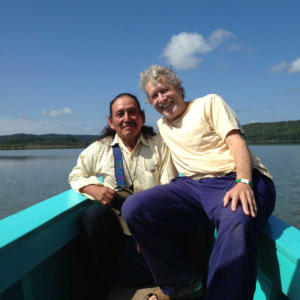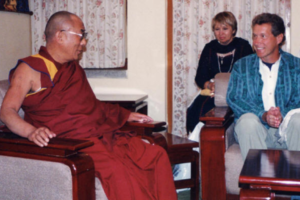John Perkins (Ecuador) and TOUCHING THE JAGUAR
Thanks for the ‘heads up’ from Dan Campbell (El Salvador 1974-77)
TOUCHING THE JAGUAR: John Perkins (Ecuador 1968-71) on his new book and envisioning a better future.
The author of “Confessions of an Economic Hit Man” discusses how we can collectively harness this moment to transform our economy
by Emily Green | 9 Jul 2020
Street Roots Portland, Oregon
John Perkins (Ecuador 1968-71) is a well-known author among readers of two seemingly divergent genres.
Among his more political-minded readers, he’s known for writing the 2005 bestseller, “Confessions of an Economic Hit Man.” In it, he revealed how for years he worked as a consultant hired to convince developing nations to build unnecessary infrastructure projects. The projects not only enriched large, usually American, corporations, but also indebted poor nations to countries like the U.S., putting them at an economic and political disadvantage. He subsequently wrote four more books about the economic colonization of poor nations.
Among new age spiritualists; however, Perkins is known for his earlier books about the mystic teachings of master shamans, most notably of Mayan and Amazonian Indigenous cultures, whom he first encountered while volunteering with the Peace Corps.
That same “John Perkins” wrote both collections may come as a surprise to some of his fans, but he sees a strong connection between his past as an economic hit man and the spiritual path he later followed.
“Both of those parts of our society,” he said, “are driven by the concept of molding realities through molding perceptions — but it wasn’t overt.”
Berrett-Koehler Publishers
 His new book, “Touching the Jaguar: Transforming Fear into Action to Change Your Life and the World,” is intended to bridge his bodies of work together. Within its pages, he explains how lessons learned in the Amazon helped him walk away from his job as a chief economist at an international consulting firm and embrace a new identity as an environmental activist and champion of Indigenous cultures.
His new book, “Touching the Jaguar: Transforming Fear into Action to Change Your Life and the World,” is intended to bridge his bodies of work together. Within its pages, he explains how lessons learned in the Amazon helped him walk away from his job as a chief economist at an international consulting firm and embrace a new identity as an environmental activist and champion of Indigenous cultures.
The book’s title, “Touching the Jaguar,” comes from a basic shamanistic teaching, he said. The jaguar represents the fear or belief that’s blocking an individual from evolving. To touch it, is to acknowledge and confront it, and then reshape that fear into a catalyst for transformation.
Perkins is also a founder of the Pachamama Alliance and Dream Change. The two nonprofits are aimed at realigning humanity’s trajectory away from resource depletion and greed — what he calls a “death economy” — and toward a more sustainable and spiritually fulfilling future based on a “life economy.” In addition to promoting this shift through education, in 2018, Dream Change helped a Kogi community purchase more than 30 acres of their ancestral lands.
“Transforming the Jaguar” was released in hardcover last month. Powell’s Books will host a virtual conversation between Perkins and YES! Magazine cofounder David Korten at 5 p.m. on July 29 on Zoom. Register on Zoom to attend.
•
John Perkins recently spoke with Street Roots from his home in Bainbridge Island, off the coast of Seattle in the Puget Sound.
Emily Green: We speak this morning amid historical events, and I’m curious about the lens through which you’re viewing them. I’d like to start by asking you about the protests, following the police killing of George Floyd. Do you think that as a nation we are, in some way, touching a “collective jaguar” at this time, as we decry the ongoing oppression of Black Americans?
John Perkins: When we talk about touching a jaguar, a jaguar is a barrier that keeps us from moving forward the way we know we ought to move forward. When we touch that jaguar, it gives us the energy, the power, the wisdom, the patience and the courage to move forward.
Trevor Noah gave a brilliant speech, whereby he said a society is based on a contract, and the contract has to work in both ways. And he says it’s kind of amazing that people of color have gone along with the contract for so long, even though they’ve suffered tremendously.
We do have a society that’s based on an agreement that’s not signed, but it’s understood — specifically in the United States — it says basically that all people are created equal. And, the white, dominant community has not kept that contract.
And so the jaguar that’s standing there right now — it’s been there for a long time — says that for some reason white people have privileges that nobody else has in this country, and now we’re being forced to touch that jaguar.
It’s happened throughout my lifetime, I remember in the late ‘60s, early ‘70s, there was an uprising and the statement being made then was the contract isn’t working for us. And, it’s happening again — and it needs to happen.
We need to be forced to adhere to, respect and enforce the contract that we have to ensure that all people do have equal opportunity and that we don’t have this white prejudice and racial bias. As a white male, I know I have tremendous privileges just because of the color of my skin and my gender, and I don’t deserve those privileges, but I have them. I don’t seek them out, I try not to abuse them, but they are there.
I know if I get stopped for speeding on the highway, I’m probably not going to be asked to get out of my car, I’m probably just going to be asked to show my license and registration, and I may get a warning or ticket, and I drive off.
But many people of color feel that if they get stopped, they are going to get pulled out of the car, they may be asked to put their hands on top of the car, they may be frisked, they may be beaten if they say anything wrong at all or anything that could possibly be interpreted as wrong — or if they happen to be up against a white cop that for some reason has animosity toward them, they may be badly treated and may end up in jail. That’s terrible.
So yes, we’re touching a jaguar in this culture — I hope that we will really touch it. When you touch the jaguar, the jaguar says, here’s the way forward, you’ve got to find a way to meet the contract, to satisfy the contract of what it means to be a society and a country that claims to be a leader along the democratic path.
Green: We’re also in the middle of the worst global pandemic in 100 years, one that’s brought many cogs in the economy to a grinding halt. Do you see the potential to harness this moment for more lasting change and a move toward what you describe as life economy?
Perkins: I’ve been writing for some time about how we need to make a transition from a death economy to a life economy, and I think that the Earth has been speaking to us in many ways.

John Perkins and Tata Domingo, a shaman in the highlands of Guatemala Perkins has known for many years. They are pictured here at Lake Peten Itza. Photo courtesy of John Perkins
A number of years ago I took a group of people to visit a shaman (Maria Juana) in the highlands of the Andes of Ecuador, Peru. Someone asked, how do we save the Earth, and she laughed, and she said, “The Earth’s not in danger. We are, as a species. We’re like so many fleas, and if we get to be too much of a nuisance, she’ll just shake us all off.”
Then she pointed to a volcano near her home and she said, just a few years ago that volcano was covered with a big ice cap — it is no more. Mother Earth, “Pachamama,” is twitching. She isn’t shaking us off, but she’s giving us a warning. We better listen.
Every time there’s been a major hurricane, earthquake or tsunami or any of these once-considered 100-year events, but that now seem to happen every year or so, I thought about that.
We’re really being forced to look at what we are doing wrong. And what we’re doing wrong is huge — we’ve created a death economy, and this is an economic system that’s not just economic. It’s governmental, social, environmental, and it’s treated nature like a slave, and it’s treated a great many people on this planet like slaves — or the modern form of that, at least as inferior.
In a way, the coronavirus combined with the riots that we’re experiencing in the United States and other countries right now — they kind of go hand in hand, and I think this message is coming across very strongly, that we can’t return to normal.
We should not want to return to normal. We need to create a new normal, and that new normal is an economic system that is much more socially just, and environmentally sustainable, and even, dare I say it, spiritually fulfilling.
An economic system that pays people to clean up pollution to regenerate destroyed environments, recycle and create new technologies that don’t destroy the Earth — truly a life economy. It’s the kind of economic system that for most of our 250,000 years as human beings on this planet we’ve experienced. It’s only been within the last historical eyelash that we’ve moved toward this attitude of real greed, maximization of short-term economic benefits and profits.
Green: Much of your new book is about changing perceptions. I was hoping you might elaborate on the words of Maria Juana, who said, “Just change the story we tell ourselves.” How would you apply that to this moment in history?
Perkins: Human reality is hugely impacted by human perceptions. If you think about it, there’s no Canada, there’s no United States, there’s no culture, there’s no religion, there’s no corporations, there’s no economies — except as we perceive them.
When enough people accept a perception that’s codified into law, it has a big impact on reality. And we’ve created a reality right now that’s destroying us. This death economy that’s consuming itself into extinction is based on greed and individuality.
The stories we’ve been telling ourselves and teaching our kids in school and business school and so forth, all revolve around this idea that you’ve got to maximize your short-term profits for corporations and short-term consumer materialism for individuals — short term, short-term — forget about the future. Well, that story now is coming true. The future that we’ve been forgetting about has arrived. And, it’s going to get worse if we don’t listen and start to tell ourselves new stories.
So, stories mold our perception, we have a perception and then we tell stories around it, so it’s time we told stories about how we must move into a life economy. Even before the coronavirus outbreak, the stories were beginning to change: the advent of B corporations, conscious capitalism, the Green New Deal, the 192 executives of some of the most powerful companies in the world came together last August. They had a business roundtable and advocated for saying that the goal of corporations can no longer be short-term profits only. It has to look at the long term: How do you benefit your employees and your consumers and your suppliers and the communities where you work?
These movements toward a life economy have been growing over the last few years, and hopefully what we’re going through now, regrettably with so much pain and suffering and death for so many people, will push us even harder to move forward into a much more socially just and environmentally sustainable human presence on this planet.
Green: I wanted to touch on “Dream Change” — it’s a chapter in your new book, and it’s also the name of a nonprofit you founded. It would really seem that this pandemic has a way of illuminating everything that’s wrong in our society, but what advice would you give for how to move toward envisioning what is right?
Perkins: The idea of “dream change” is the idea of perception change, part of one of my other books, The World Is As You Dream It, a phrase that came from shamans. By “dream,” they mean the perception that we have of what it means to be human.
How do we go about changing that at this time? I think it’s really important for each of us to start telling the stories that relate to how we really create a life economy.
Let me give you a couple examples, and you can use these examples for anybody at different jobs: I’m a writer, and I’ve devoted myself to writing true stories to inspire people to transform the death economy to a life economy, that’s how I do it, as a writer. But I have a friend who is a carpenter, and he loves working with wood, with his hands. He said, “How do I use this in a way that will help make a better world?” And I said, “Well, just use sustainable materials.” And his jaguar that stood there and blocked him said, “My clients are going to say that those materials may cost more, I can’t afford to pay that.” My response was, “Touch the jaguar, and the jaguar will say something like ‘Hey, tell your clients it’s not a cost, it’s an investment in the future, in their own future and their children’s and grandchildren’s future.’”
What we do and who we are — parent, teachers, whether you’re a plumber, a journalist, like you are, there is a road here that we can take that will help us understand how we can use our individual passions and skills to not only create the life we want for ourselves, but also create a better world.
The book, Touching the Jaguar, really gets into that and the process, and offers an exercise we can do for less than 10 minutes a day, or once a week, whatever feels right, but it’s a process where you can really look at what you, individually, want to do for the rest of your life and what’s blocking you from doing that, and how do you touch that blockage, and how do you tie in what you want to do for the rest of your life with other people. Maybe one other person, maybe your family, maybe the whole world, but we’ll all feel more satisfied with our lives if we help other people.
The next step is every day to take some action to make it happen. And that action can be as simple as sending out a tweet or an Instagram post, or it can be as ambitious as running for public office — and everything in between. But what’s important is every day you do some little thing to move you further down that line of doing what you most want to do in your life and doing it in a way that’s going to help other people.


No comments yet.
Add your comment